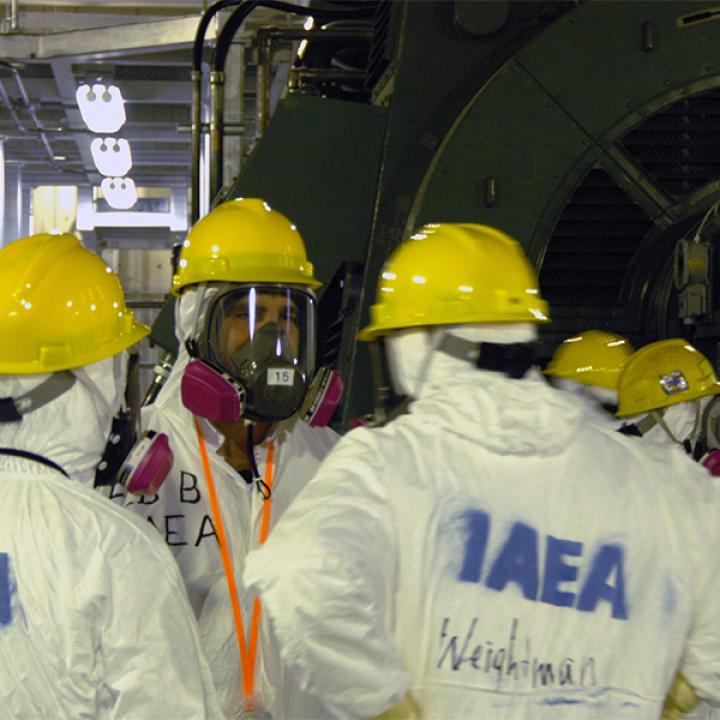
- Policy Analysis
- Articles & Op-Eds
Here's Where Advocates and Critics of the Iran Nuke Deal Can Agree

Supporters should see the administration's threats as a last chance to salvage the deal, while critics should seize the opportunity to correct its flaws.
President Donald Trump's threat that the United States could withdraw from the Iran nuclear agreement unless it is strengthened has alarmed the accord's advocates. Yet the danger to the deal is not new—the seeds of its possible demise were sown in 2014 and 2015, during its negotiation in Europe and the attendant debate in Washington. Trump's critics are right that the administration's gambit could kill the deal. Yet Trump's position also represents an opportunity to stabilize and strengthen the agreement—a chance both its advocates and critics would be wise to seize.
When the Obama administration submitted the nuclear deal—known as the Joint Comprehensive Plan of Action, or JCPOA—for review in the summer of 2015, every Republican member of Congress, joined by a handful of Democrats, voted against approving it. Likewise, every Republican presidential candidate criticized the deal, none more harshly than Trump did. Such agreements require not only a measure of international consensus, but also the backing of a sufficient domestic coalition in the countries that are party to them.
The absence of such a coalition in the United States should have been clear to (and a clear sign of trouble ahead for) all involved. Indeed, what is surprising is not that the president is now threatening to walk away from the deal, but rather that he has not done so already. Tempting as it is, though, to ascribe the divisions in Washington over the JCPOA to partisan politics, the differences do in fact have substantive roots.
While there are many technical details in the agreement's 159 pages to quibble over, its real flaws, as seen by critics, are conceptual. Three problems stand out. First, the JCPOA permits Iran to continue enhancing its nuclear weapons capabilities even while adhering to the letter of the agreement. It allows Iran to conduct research and development to improve its centrifuges and to develop and test potential delivery systems, and does not require Iran to submit a declaration of its past nuclear-related work. Second, the deal offers relief from sanctions that were targeted at a broad range of troubling Iranian activity in exchange for Iranian restraint in just one area, albeit a critical one. Third, it offers sanctions relief construed as indefinite, while the most important nuclear restrictions on Iran only for another six to 13 years.
While experts can disagree over whether these flaws are fatal, the absence of a bipartisan political consensus on that point means that even if Trump had not issued his threat, the deal would be lucky to survive the slings and arrows of Congressional efforts to deter Iran, or the ups and downs of the U.S.-Iran relationship. Yet there is no easy or cost-free way out. Walking away would trigger a diplomatic crisis between the United States and its allies.
Thus, advocates and critics of the JCPOA alike should see the Trump administration's gambit as an opportunity. For the former, it likely represents the best chance to salvage the deal, and for the latter, the best chance to correct its flaws. Success could mean stabilizing and strengthening it, and restoring transatlantic unity not just on the accord itself, but also on a broader policy toward Iran. Fixing the deal will require pragmatism on all sides, and an approach that utilizes all of America's policy tools, not just sanctions.
The Trump administration has made clear that it is not seeking to renegotiate the JCPOA, since doing so is widely deemed unrealistic. Instead, the White House aims to strengthen the deal from without. The president has indicated the administration is seeking to do this in two ways: first, by securing new legislation from Congress to oversee the deal, and second, by negotiating a supplemental agreement between the United States and European Union outlining a common Iran policy.
The president has indicated that both the legislation and the U.S.-European agreement would need to address several of the deal's conceptual flaws. Both would have to aim to deter Iran from resisting international nuclear inspections, developing long-range missiles, and making progress toward a nuclear weapon. He has also insisted that such measures be permanent. Finally, he has called on European allies to join the United States in countering Iran's non-nuclear activities.
Given that the JCPOA permits Iran to continue substantial nuclear activity and does not require it to disclose past work, and that Iran has a track record of deception, robust inspections are necessary to provide confidence that its nuclear weapons work has not resumed. The JCPOA provides significant authorities to International Atomic Energy Agency (IAEA) inspectors—the key is that they be interpreted expansively and applied aggressively.
On this issue, the problem does not lie with Iran. Iranian officials have insisted that military sites are off-limits to inspectors. However, until Iran actually refuses a request for such access, this is mere posturing. And should such a request actually be refused, few would dispute an American contention that Iran had violated the nuclear accord. More worrisome is that such a request will never be made, either due to insufficient intelligence, or because Iran's bluster deters nuclear inspectors from requesting access to suspicious sites, or leads them to bend over backwards to help Iranian officials save face.
To prevent this, the administration and Congress should ensure the continued prioritization of intelligence on Iran's nuclear activities, and be forward-leaning in passing suspicious information to inspectors. The United States and its allies, in turn, should push inspectors to follow up, make clear that there are no blanket exemptions to inspections, and ensure that Iran will not be permitted to dictate how or by which inspectors monitoring is conducted. We should also push the IAEA to follow up on Iran's past nuclear weapons research, to ensure that the facilities and personnel who were involved are not back at work. Together, Britain, the EU, France, Germany, and the United States constitute a majority of the eight-member joint commission that adjudicates disputes under the nuclear accord, making any such common positions decisive in adjudicating the deal's implementation.
When it comes to missiles, Iran already possesses the Middle East's largest arsenal. The United States and its allies should focus on the capabilities of that arsenal rather than its size or existence. We should focus on four specific concerns—Iran's development of long-range missiles, which lack any conventional purpose; work to fit missiles with nuclear warheads; the development of cruise missiles, which pose a particular challenge to missile defenses; and the proliferation of missiles to Iranian proxies such as Hezbollah in Lebanon and Houthi rebels in Yemen.
These matters are not dealt with in the nuclear accord. Yet there is little reason to seek to retroactively amend the JCPOA to address missiles. The U.S. stance should be that missiles are either in or out of the accord—if Iran accepts no obligation under the JCPOA to limit its missile work, the United States and its allies acknowledge no obligation to refrain from penalizing those efforts. The competing notion that Iran is granted impunity under the JCPOA to engage in any activity not specifically restricted under the deal should be contested at every turn.
Congress should thus not hesitate to impose sanctions on Iran for its missile activities, assuming these do not simply replicate sanctions relieved under the JCPOA in a different guise. And the administration should push for the multilateral adoption of those sanctions, and for reinvigorated export control and interdiction efforts that go beyond sanctions. There is ample justification without reference to the JCPOA. Iran's missile activities often violate other UN resolutions, such as those barring the provision of arms to Hezbollah and the Houthis, as the UN itself has acknowledged, or calling for Iran to exercise restraint with regard to missile testing. If U.S. allies are unwilling to enforce UN resolutions, they sacrifice any moral high ground in complaining about U.S. compliance with the nuclear accord, which carries no more or less weight.
The issue of sunsets—the expiration of restrictions on Iran's nuclear activities—is perhaps the most difficult problem with the JCPOA to mitigate. Many arms-control deals in the past were temporary. But the expectation was and should remain that the restrictions they imposed would be extended and expanded rather than allowed to lapse. Even if, against the odds, the U.S.-Iran relationship were to improve in the coming years, it would be unreasonable to expect that the rapid and large expansion of the Iranian nuclear program would not prove destabilizing to the region. The JCPOA does not change that reality.
To remedy this, the United States and its European allies should state publicly that the expirations do not imply that America or Europe will accept the unchecked expansion of Iran's nuclear activities, but rather that they expect Iran to negotiate a follow-on accord or practice self-restraint. In addition, the United States should resume efforts to more broadly restrict the expansion of fuel cycle activities globally, so that Iran is confronted with a more restrictive nonproliferation regime as the JCPOA's provisions fade.
Congress can usefully underscore the point by vowing that sanctions will return should the United States believe Iran to be taking steps toward a nuclear weapon. In reality, any future president confronted with such a scenario may not wait for sanctions to bite before acting more decisively, and this and future administrations should make that explicitly clear. Such steps would be intended not only to deter Iran, but also to reassure regional allies and dissuade them from preparing their own nuclear deterrents in anticipation of an unfettered Iran in a decade's time.
When it comes to countering Iran's non-nuclear activities, neither Iran itself nor specific Iranian entities should be exempt from deterrence for the sake of preserving the JCPOA. An Iran nuclear policy must not only coexist with, but reinforce, a broader Iran policy.
On this front, however, the ball is in the Trump administration's court. The United States has thus far offered tough rhetoric about countering Iran, but little in the way of concrete policies. While sanctions against Iran's Islamic Revolutionary Guard Corps, and Iranian proxies like Hezbollah, are necessary, they are no substitute for political strategies to counter Iranian gains across the region and deny Iran further opportunities. If the United States were to put forward such strategies, it might find that it was pushing on an open door. When the United States struck a Syrian airbase last April in response to a chemical weapons attack, the chief complaint one heard from Europeans was not that the attack took place, but that it was not followed up with further pressure on the regime of Syrian President Bashar al-Assad and his partners.
Whether or not one supports or opposes the Trump administration's approach to the JCPOA, it is important to recognize that the nuclear agreement is not in danger solely due to the president's threats to roll it back. It has been endangered since its inception due to its lack of bipartisan support and its lack of connection to any broader policy toward Iran. Addressing those problems is in the interest of the nuclear deal's advocates and critics alike.
Michael Singh is the Lane-Swig Senior Fellow and managing director at The Washington Institute. Previously, he served as senior director for Middle East affairs at the U.S. National Security Council from 2005 to 2008.
Foreign Policy



